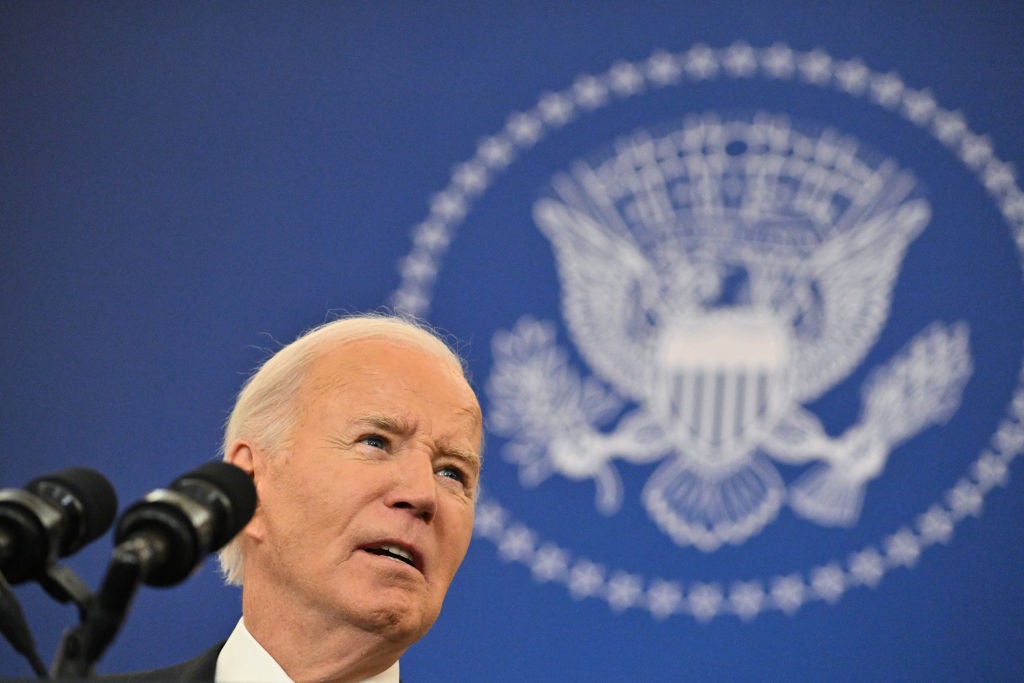Four years after President Joe Biden entered office with the intent on strengthening American alliances that had been neglected during Donald Trump’s first administration, he says he’s leaving office having accomplished those goals.
In his final foreign policy address at the State Department on Monday, the US president declared that America was “winning the worldwide competition” while pointing to a strengthened — and growing — North Atlantic Treaty Organization and other new and upgraded US alliances as evidence.
“Today, I can report to the American people, our sources of national power are far stronger than they were when we took office,” said Biden, adding that America’s adversaries were conversely “weaker than they were when we came into this job four years ago.”
The remarks will be just one of several events the administration has planned to mark Biden’s final week in office, after which he’ll close out more than a half-century in public service by attending Trump’s second inauguration to mark the peaceful transfer of power he was denied four years ago when Trump attempted to overturn his 2020 election loss.
The president’s final foreign policy speech was initially set to be delivered as a bookend to Biden’s final trip aboard as president, a visit to Rome that was scuttled to allow him to oversee the federal response to the wildfires that have devastated Los Angeles and the surrounding area.
According to White House sources, it was intended as reflection on the 46th president’s 50-plus years in national politics, beginning with his improbable victory in the 1972 Delaware Senate race as a 29-year-old unknown, leading to three decades in the upper chamber, then the vice presidency under Barack Obama, and ultimately the presidency.
His trip to the State Department’s headquarters in the Foggy Bottom area of Washington comes just under four years to the day he spoke to employees there at the outset of his term. Since that day, America’s global footprint has evolved dramatically, with his administration ending the US’s longest-running war and pursuing a renewal of ties with allies across Europe and Asia.

Over his one term in the White House, the foreign policy landscape shifted against the US. His administration quickly found itself confronting a massive, armed Russian invasion of Ukraine and just as the 2024 presidential election began in earnest was forced to witness a shocking terrorist attack in Israel, the deadliest in the nation’s history. The attack was followed by a bloody siege of Gaza with a civilian death toll in the tens of thousands — a conflict which defined his last year in office.
Four years ago, Biden told the audience of largely career foreign service professionals that the message he wanted to send the world was that diplomacy was “back at the center of our foreign policy” after four years with Donald Trump in office carrying out the transactional, bellicose “America First” policy that has been the hallmark of his time in politics.
America, he said, had to lead at a “new moment” in world history that required countering what he described as “advancing authoritarianism, including the growing ambitions of China to rival the United States and the determination of Russia to damage and disrupt our democracy.”
He also said that diplomacy in that moment had to be “rooted in America’s most cherished democratic values,” including “defending freedom, championing opportunity, upholding universal rights, respecting the rule of law, and treating every person with dignity.”
Administration officials describe his foreign policy efforts as having been largely successful and as leaving the country — and the world — in a stronger place than it was when he entered the White House amid the chaos of the Covid-19 pandemic.
At a White House briefing before Biden’s remarks on Monday, White House National Security Adviser Jake Sullivan told reporters that Biden is leaving office with the U.S. in a far stronger position than her enemies after his four years in power.
Biden, a committed internationalist who has spent decades in public life steeped in foreign policy matters, first as a member of the Senate Foreign Relations Committee and later as vice president and as president, leaned on his half-century on the world stage as he brought together a coalition of more than 50 nations to support Ukraine in the face of Russia’s invasion
He also successfully spearheaded efforts to strengthen the NATO alliance by adding two long-neutral nations, Finland and Sweden, to the now-32 member defensive bloc. And over the objections of Trump-aligned Republicans, he shepherded hundreds of billions in American aid into the hands of Kyiv’s fighting forces, helping Ukraine withstand an assault from the world’s second most powerful military.

But it was the seemingly intractable conflicts in Afghanistan and the Middle East that gave his critics the most ammunition against him.
Just seven months after he took office, American forces, on his orders, executed the complete withdrawal from Afghanistan that had been agreed to under a deal the previous Trump administration had made with the Taliban.
Biden, a longtime critic of the decadeslong war that began with an American invasion following the September 11, 2001 terror attacks and continued through 20 years of nation-building amid a non-stop Taliban insurgency, was adamant that the withdrawal take place despite signs that the American-backed Afghan government could not survive without the continued presence of U.S. troops in the country.
Instead of handing off the fight against the Islamist insurgents to the democratic government that the U.S. and NATO had helped establish after ousting the Taliban two decades earlier, what ensued was a total failure of the Afghan National Army that the West had spent billions to train and equip. Suddenly unsupported by US contractors, the government collapsed as soon as it became clear that the Americans were leaving, and the small force that remained to carry out the final evacuation of U.S. personnel was left to negotiate with the Taliban to ensure their own safety.
After the dust cleared, the scope of the US’s failure was evident. The reestablishment of the Taliban government in Kabul and the continued existence of ISIS-K in the country led many to question whether the US had achieved any lasting in the war gains at all.
The images that came out of Kabul tore Biden’s political momentum to shreds and became the defining picture of his first year in office — desperate men and women chasing an Air Force cargo plane as it took off, with bodies of some of those Afghan would-be refugees falling to their deaths from aircraft wheel wells.

And the faces of 13 U.S. Marines who died when an ISIS-K suicide bomber detonated himself at Kabul International Airport came to haunt Biden, as the families of those fallen servicemembers came to blame the 46th president and embraced the 45th president’s campaign to return to office.
The president defended that withdrawal in his speech, while holding that he would not forget the sacrifice of US service members who were deployed to the country.
“In my view, it was time to end the war and bring our troops home. And we did,” said Biden. “Critics said if we ended the war, it would damage our alliances and create threats to our homeland from foreign-directed terrorism [based] out of a safe haven in Afghanistan.”
“Neither has occurred,” he stressed in response. “Neither has occurred.”
“Ending the war was the right thing to do, and I believe history will reflect that.”
Biden’s doomed quest for re-election would also be dogged by the faces of more innocents — the hundreds of hostages taken by Hamas during the October 7, 2023 terror attacks on Israel and the thousands of dead and wounded Palestinians who would meet grim fates during Israel’s yearlong retaliatory war against Hamas. With his presidency in the rear-view mirror and his negotiators still working in the final days, numerous hostages including more than a half dozen Americans remain in Hamas captivity as the war verges on outlasting Biden’s time in power.
A staunch supporter of Israeli self-defense since his arrival in the Senate more than five decades ago, Biden travelled to Israel to literally embrace embattled prime minister Benjamin Netanyahu within days of the attack. It was a fateful political choice, and one that backfired. His Israeli contemporary would go on to publicly clash with his US beneficiaries at every turn, falsely accusing American officials of enacting an arms embargo and weighing down Biden with his own base of supporters.
He would continue backing the Israeli war on Hamas even as Netanyahu’s right-wing government was determined to be blocking needed humanitarian aid from reaching Gaza, and even as Israeli forces continued to carry out strikes against schools and hospitals — conduct that might have been condemned as war crimes under other circumstances.



